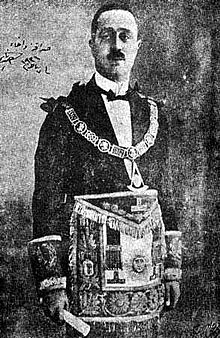Ahmad Nami
Al-Damad Ahmad Nami ( Arabic أحمد نامي, DMG Aḥmad Nāmī ) or Damat Ahmet Nami (* 1873 in Beirut ; † December 13, 1962 there ) was the fifth Prime Minister and second President of Syria .
Life
Nami was born into a wealthy family related to the Osman family, was of Turkish origin and could hardly speak Arabic. He graduated from the Ottoman Military Academy and also received military training in Paris .
In 1910 he married Ayşe Sultan, daughter of Abdülhamid II, and thus received his title Damad ( Turkish for son-in-law). The couple had two sons: Ömer Nami Osmanoğlu and Osman Nami Osmanoğlu. In June 1920 he was delegated by the French officers in the Beirut region to form a government. In June 1926, all ministers in his cabinet resigned in protest against French policy towards the nationalist movement, which led to its arrest by the High Commissioner of the Levant , Henry de Jouvenel . Nami tried to get their release but was threatened with arrest, whereupon he replaced his ministers with pro-French ones.
Nami worked relentlessly against the establishment of an independent Lebanon . He also demanded compensation from the French for those residents whose houses were destroyed during the Syrian Revolution . There was also the demand for a general amnesty for Syrians in exile in order to guarantee their return. This request was rejected and Nami accused of establishing a monarchy. This resulted in his being removed from office on February 8, 1928.
In 1932 the French were aware of the idea that Nami should be installed as king, but this never came about. Eight years later, he was seen as a possible candidate for president, but the Bloc national opposed it.
In the 1940s, Nami retired from public life and lived in Lebanon again.
Individual evidence
- ↑ Beşşar'ın koltuğunun ilk sahipleri, Yıldız Sarayı'ndan yetişmiş bu iki Osmanlı idi. Retrieved July 28, 2020 (Turkish).
- ↑ 'Osmanlı'ya veda. Retrieved July 28, 2020 (Turkish).
| personal data | |
|---|---|
| SURNAME | Nami, Ahmad |
| BRIEF DESCRIPTION | Syrian Prime Minister and President |
| DATE OF BIRTH | 1873 |
| PLACE OF BIRTH | Beirut |
| DATE OF DEATH | December 13, 1962 |
| Place of death | Beirut |
